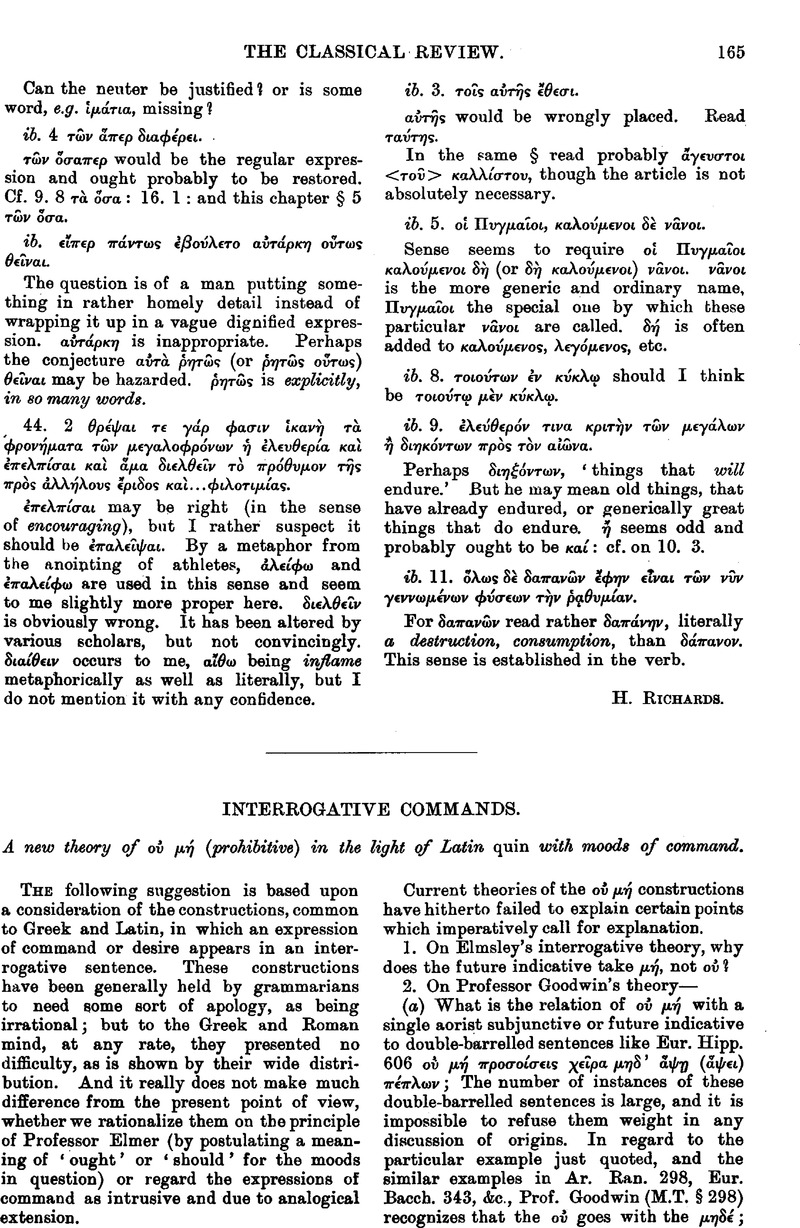No CrossRef data available.
Article contents
Interrogative Commands
Published online by Cambridge University Press: 27 October 2009
Abstract

- Type
- Original Contributions
- Information
- Copyright
- Copyright © The Classical Association 1902
References
page 166 note 1 It is true that the negative in Latin is non, in Greek μή. But this does not concern us here. For the subjunctives in loquamur an non loquamur! are both expressions of desire, as in the Greek ![]() . The difference in the negative only shows that in Latin the subjunctive had developed somewhat in the direction of a statement, as distinct from a command, so that loquamur might mean ‘ we ought to speak,’ as distinct from ‘let us speak,’ and non loquamur? ought we not to speak?’ To suppose that we have here to do with two distinct kinds of subjunctive seems to me an exaggeration. But Prof. Elmer's treatment of this point aids in the logical analysis of these? deliberative ’ questions, whether in Latin or Greek; for in Greek, too, the only way to rationalize μὴ εἵπωμεν; is to say that it means nonne nobis loquendum est?and the same treatment must be meted out to the interrogative imperative, Greek and Latin. I am glad of an opportunity of associating myself with the Editor of this Review (vol. xiii. p. 414 and p. 68, and vol. xv. p. 451) in a protest against the misleading term? deliberative,’ and the still more misleading? dubitative,’ as applied to these questions; I have found it a bar to understanding, Decause it leads to the inference that these questions must be addressed to the speaker himself; whereas, of course, they may be equally well addressed to another; and they may be questions expecting an answer just as well as rhetorical questions expecting no answer. Cf. Ter. Phorm. 540 GE. Quid faciam?AN. Invenias argentum. GE. Cupio; sed id unde, edoce. The so-called deliberative question is simply a question as to what is or was to be done, as Madvig taught us long ago.
. The difference in the negative only shows that in Latin the subjunctive had developed somewhat in the direction of a statement, as distinct from a command, so that loquamur might mean ‘ we ought to speak,’ as distinct from ‘let us speak,’ and non loquamur? ought we not to speak?’ To suppose that we have here to do with two distinct kinds of subjunctive seems to me an exaggeration. But Prof. Elmer's treatment of this point aids in the logical analysis of these? deliberative ’ questions, whether in Latin or Greek; for in Greek, too, the only way to rationalize μὴ εἵπωμεν; is to say that it means nonne nobis loquendum est?and the same treatment must be meted out to the interrogative imperative, Greek and Latin. I am glad of an opportunity of associating myself with the Editor of this Review (vol. xiii. p. 414 and p. 68, and vol. xv. p. 451) in a protest against the misleading term? deliberative,’ and the still more misleading? dubitative,’ as applied to these questions; I have found it a bar to understanding, Decause it leads to the inference that these questions must be addressed to the speaker himself; whereas, of course, they may be equally well addressed to another; and they may be questions expecting an answer just as well as rhetorical questions expecting no answer. Cf. Ter. Phorm. 540 GE. Quid faciam?AN. Invenias argentum. GE. Cupio; sed id unde, edoce. The so-called deliberative question is simply a question as to what is or was to be done, as Madvig taught us long ago.
page 166 note 2 Dräger, for instance, in his Historische Syntax (I. 2, p. 327), after quoting the comedians (and, it is true, Cic. Mil. 29, 79) says? scheint später nicht mehr vorzukommen’ (!)—a statement which is the more inexplicable as he calls the quin a? Steigerung’ (i.e. strengthening) of the imperative; cf. his quotation of quin redeamus Ter. Eun. 811 among instances of hortative subjunctives in statements (p. 311).—Lewis and Short are mistaken in saying that the subjunctive with interrogative quin is found only in oratio obliqua, as the following table will show.
page 167 note 1 Quin in statements is simply a development of the interrogative quin:? why not?’ has passed into a meaning which may well be translated? why ’ (not interrogative), which is equivalent sometimes to? nay on the contrary,’ sometimes to? nay more.’ The locus classicus for this usage is Plaut. Cas. 602–609, cf. Aul. 300, 302, 312; and the passage to the affirmative sense is well shown by such instances as Cas. 285 CH. quin emittis me manu?LY. quin id uolo (‘ why that is just what I want!’); in Merc. 764 quin nego may be taken either as a question with the deliberative present indisative (‘why should I not deny it?’) or as a statement (‘nay on the contrary I deny it’): cf. ibid. 461, Capt. 589, 990. Note Merc. 322 quin (MSS. qui) non obiurgo, which is a negative statement.
page 167 note 2 In these instances the verb has generally been regarded as future indicative (without note of interrogation), but I prefer the interrogative subjunctive in both passages.
page 167 note 3 I do not insist on the note of interrogation after these instances, though I think it suits the context in some at least of them. Still I have already admitted that quin loses touch with its interrogative origin in some sentences (see note 1, supra, and it may do so to some extent here also.
page 167 note 4 In my note on this passage I wrongly followed previous grammarians in calling the construction? peculiar to comedy.’—Among the numerous other instances of quin with the imperative in Plautus and Terence there are some in which the phrase is combined with quin and the indic., e.g. Capt. 636, Most. 815, Asin. 254 (according to the MSS.).


